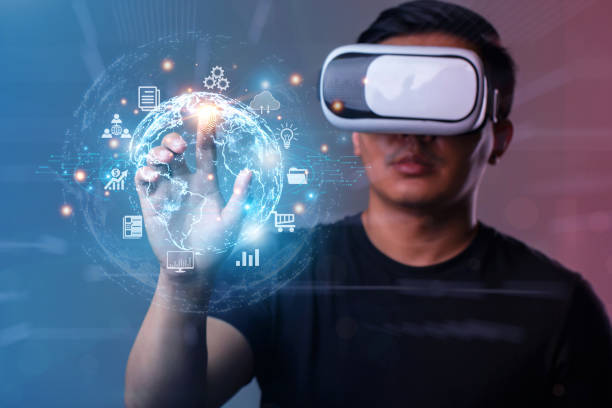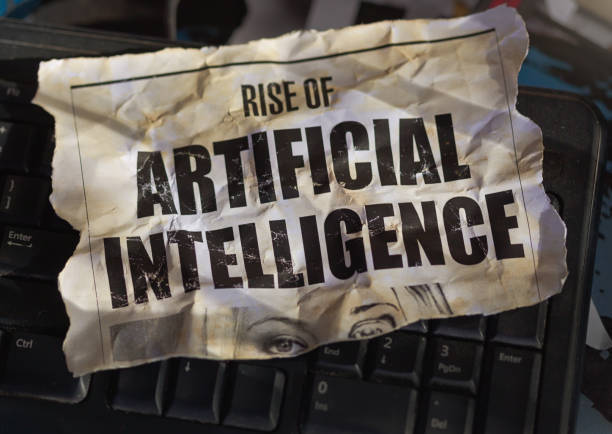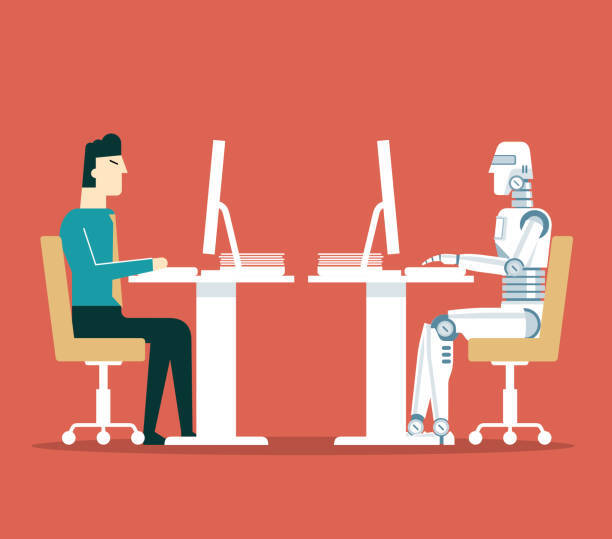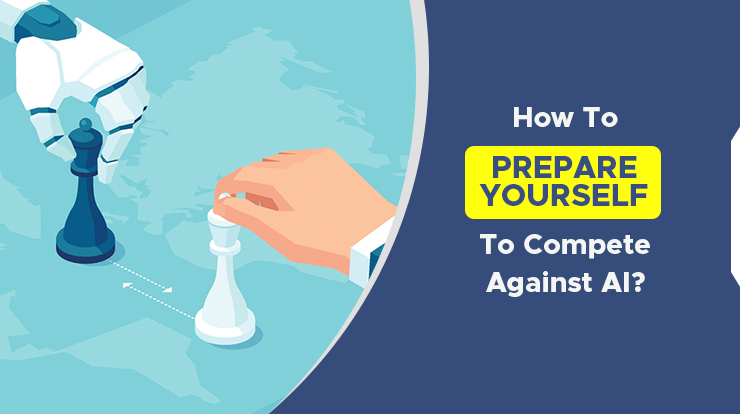Artificial intelligence (AI) is changing the way we live, work, and interact with one another. The impact of AI is immense and undeniable. AI has already transformed various industries such as healthcare, finance, transportation, etc. AI also transforms businesses‘ operations, making them more efficient, productive, and profitable.
However, with all the benefits AI brings, there are concerns about its negative impact on society and the workforce. As AI grows and expands, we must prepare ourselves to compete against it. One of the major problems students and professionals face is the lack of documentation and real-time AI explanations. As a result, they cannot learn everything in detail until and unless they delve deep into gaining hands-on experience.
Additionally, technology is evolving, which is why people have to keep themselves upgraded. But this is not as easy as it sounds. If AI replaces human activities, many people will lose their jobs, especially those involved with low-income work. Therefore, learning about AI challenges and mitigating them is crucial.

Impact of Artificial Intelligence
The impact of AI is both positive and negative. AI can improve our lives, such as healthcare, education, and transportation. AI can help doctors diagnose and treat diseases more accurately and efficiently. AI-powered educational tools can help students learn more effectively. AI-powered transportation can reduce traffic congestion and make commuting more efficient.
However, there are also concerns about the negative impact of artificial intelligence. For example, AI can replace human workers in various industries. AI could also develop autonomous weapons that could harm civilians. Additionally, there are concerns about using AI for surveillance and invasion of privacy.
Artificial Intelligence Impact on Business
AI is transforming the way businesses operate. AI can help companies to improve their efficiency, productivity, and profitability. AI can automate routine tasks, such as data entry and customer service, freeing employees to focus on more complex tasks requiring human skills, such as problem-solving and decision-making.
With the analysis of vast volumes of data and the discovery of patterns and trends, AI may also assist organizations in making more intelligent decisions. It can help businesses predict customer behavior, optimize pricing strategies, and identify new market opportunities.
However, the artificial intelligence impact on business is only partially positive. AI can also lead to job loss and economic inequality. In various sectors, including manufacturing, shipping, and customer support, AI can take the role of human workers. It can result in employment loss and financial hardship for displaced people.
Negative Impact of Artificial Intelligence
One of the main concerns about AI is its negative impact on the workforce. AI has the potential to replace human workers in various industries. It could lead to job loss and economic inequality. By 2030, automation may cause the loss of up to 800 million jobs, according to a study by the McKinsey Global Institute.
The negative impact of artificial intelligence on the workforce is unevenly distributed. Low-skilled workers are at a higher risk of job loss than high-skilled workers. It could lead to increased economic inequality and social unrest. Governments and businesses must prepare for this potential impact by investing in education and training programs to help workers transition to new jobs.
Another concern about AI is its potential use for autonomous weapons. AI-powered weapons could make it easier for countries to engage in warfare without risking their soldiers. However, this could increase civilian casualties and make holding countries accountable for their actions more challenging. There is a growing movement to ban autonomous weapons, and governments and businesses need to support this effort.

Future Impact Of Artificial Intelligence
The future impact is hard to predict. AI is advancing rapidly, and predicting how it will evolve is difficult. However, we anticipate some potential future impacts of AI.
One potential future impact of artificial intelligence is the development of general AI. General AI refers to AI capable of performing any intellectual task a human can do. It could lead to a significant shift in how we live and work. General AI could automate most jobs, making humans free to pursue other interests.
However, the development of general AI also raises concerns about the potential impact on society. General AI could lead to massive job loss and economic inequality, leading to social unrest. Additionally, the development of general AI could raise ethical concerns about the role of AI in society.
Another potential future impact of AI is the development of AI-powered virtual assistants. AI-powered virtual assistants could become integral to our daily lives, helping us schedule appointments and manage our finances. It could lead to a more efficient and convenient way of living.
However, developing AI-powered virtual assistants also raises concerns about privacy and security. AI-powered virtual assistants could collect vast amounts of personal data, which one may use for nefarious purposes. Businesses and governments need to protect individuals’ privacy and security in the age of AI.
Impact Of AI Effect
The AI effect is a phenomenon where people tend to discount the achievements of AI and consider them trivial once they are over. It can lead to complacency and a lack of preparedness for the potential impact.
To avoid the artificial intelligence effect, it is essential to recognize the potential impact of AI and take proactive steps to prepare for it. It includes investing in education and training programs that will help workers transition to new jobs, supporting efforts to ban autonomous weapons, and protecting individuals’ privacy and security in the age of AI.
Preparing Yourself To Compete Against AI
So how can you prepare yourself to compete against AI? Here are some steps you can take:
Learn New Skills
With AI taking over routine tasks, developing skills that require human capabilities, such as problem-solving, creativity, and critical thinking is essential. You can invest in education and training programs that will help you develop these skills.
Embrace Lifelong Learning
Technological change is accelerating, and it is essential to embrace lifelong learning to stay relevant in the workforce. It includes staying current with the latest technology trends, attending conferences and workshops, and engaging in online learning.
Cultivate Emotional Intelligence
Emotional intelligence is the ability to understand and manage your emotions and those of others. It is a critical skill that AI cannot replace. Cultivating emotional intelligence can help you work more effectively with others and make better decisions.
Develop A Growth Mindset
A growth mindset believes that your abilities and intelligence can grow through hard work and dedication. This mindset can help you embrace new challenges and opportunities rather than being intimidated by them.

Stay Aware Of Industry Trends
Keeping up with industry trends and new technology developments can help you stay ahead of the curve and prepare for changes in your industry. Follow industry thought leaders, subscribe to relevant newsletters and blogs, and attend conferences to stay current.
Foster A Growth Mindset Culture
If you are a business leader, fostering a growth mindset culture within your organization is essential. Encourage employees to embrace new challenges and provide continuous learning and development opportunities. By promoting a growth mindset culture, you can prepare your organization to compete against AI and thrive in the age of automation.
Support Efforts To Regulate AI
AI can potentially transform society for the better, but it is essential to regulate its use to prevent harm. You can support efforts to regulate AI by contacting your elected officials, joining advocacy groups, and staying informed about the latest developments in AI regulation.
Conclusion
AI is transforming the way we live, work, and interact with one another. AI’s impact is positive and negative, and it is essential to prepare ourselves to compete against it. It includes investing in education and training programs, cultivating emotional intelligence, developing a growth mindset, and supporting efforts to regulate AI. By taking proactive steps to prepare for the potential impact of artificial intelligence, we can ensure that we are ready to thrive in the age of AI.
So, if you want to know more about artificial intelligence and get clarification for your doubts, you can talk with the experts at Sangam University. They provide courses to students and professionals on AI and several other related branches, including machine learning, data science, business analytics, and more.
FAQs
1. What new skills should I learn to compete against AI?
To compete against AI, you should focus on developing skills that require human capabilities, such as problem-solving, creativity, and critical thinking. Additionally, skills in areas like emotional intelligence, communication, and leadership are essential, as these are areas where AI cannot replace human input.
2. How can I stay up-to-date with the latest technological advancements?
Staying up-to-date with the latest technological advancements requires a commitment to lifelong learning. Attend conferences, workshops, and training sessions regularly, and use online resources to stay informed about the latest developments in technology.
3. What is emotional intelligence, and why is it important?
Emotional intelligence is the ability to understand and manage your emotions and those of others. It is essential in the age of AI because it enables you to work more effectively with others, make better decisions, and maintain a positive mindset in the face of change.
4. What is a growth mindset, and how can it help me compete against AI?
A growth mindset can help you embrace new challenges and opportunities rather than being intimidated by them. This mindset is crucial when competing against AI, as it enables you to view technological advancements as opportunities for growth and development.
5. How can I support efforts to regulate AI?
You can support efforts to regulate AI by contacting your elected officials, joining advocacy groups, and staying informed about the latest developments in AI regulation. Advocating for AI’s ethical and responsible use is essential to ensure its development benefits society.


